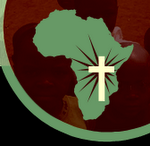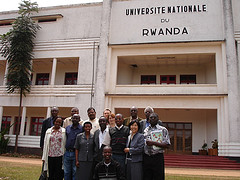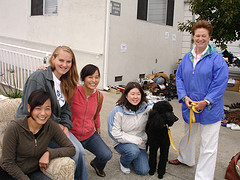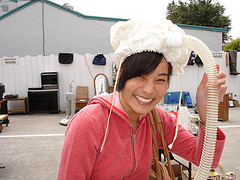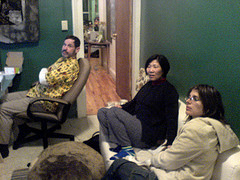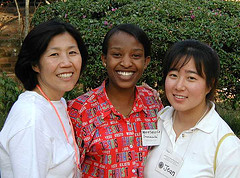Our day starts at 5 am and ends at 10 p.m. For example, mamas and children from neighborhood come to the CASA house for a morning devotions everyday except on Sunday. Even at 5 am, they praise with passion, and usually dance too. I get a good aerobics workout. There were about 45 people in the living room. We push benches to the side, and children sit down and adults sit on the benches. So many great testimonies were shared today. They all praise God with whole heart, and I see they are really glorifying God. When I see these children and also adults, I am reminded that how much they are richer than those who have so much material things in US. They are so grateful to God for what they have and they share them with others. They really don't have anything, but their heart is so rich and full.
Tuesday, July 03, 2007
We are doing well
Posted by
Come and See Africa
at
7:53 AM
0
comments
![]() Links to this post
Links to this post
Monday, July 02, 2007
Happy widow
We arrived in Rwanda last Thrusday, and our team and students have been building a new house for a widow who has five children and she has Aids. She rents a room in a house where three men also live. She told me that they give her bad time because she is a woman and also she is Hiv positive.
Last Friday morning, I visited her family.This is the place where she lives now.
Her new home site
Don is saying something to kids
10 feet hole for the outhouse
Posted by
Come and See Africa
at
3:24 AM
2
comments
![]() Links to this post
Links to this post
Friday, June 22, 2007
Faculty workshop participants
Posted by
Come and See Africa
at
12:38 PM
3
comments
![]()
Tuesday, June 12, 2007
African paradox
The Kenyan economics expert James Shikwati, 35, says that aid to Africa does more harm than good. The avid proponent of globalization spoke with SPIEGEL about the disastrous effects of Western development policy in Africa, corrupt rulers, and the tendency to overstate the AIDS problem. Mr. Shikwati, the G8 summit at Gleneagles is about to beef up the development aid for Africa... Shikwati: ... for God's sake, please just stop. SPIEGEL: Stop? The industrialized nations of the West want to eliminate hunger and poverty. Shikwati: Such intentions have been damaging our continent for the past 40 years. If the industrial nations really want to help the Africans, they should finally terminate this awful aid. The countries that have collected the most development aid are also the ones that are in the worst shape. Despite the billions that have poured in to Africa, the continent remains poor. SPIEGEL: Do you have an explanation for this paradox? Shikwati: Huge bureaucracies are financed (with the aid money), corruption and complacency are promoted, Africans are taught to be beggars and not to be independent. In addition, development aid weakens the local markets everywhere and dampens the spirit of entrepreneurship that we so desperately need. As absurd as it may sound: Development aid is one of the reasons for Africa's problems. If the West were to cancel these payments, normal Africans wouldn't even notice. Only the functionaries would be hard hit. Which is why they maintain that the world would stop turning without this development aid. SPIEGEL: Even in a country like Kenya, people are starving to death each year. Someone has got to help them. Shikwati: But it has to be the Kenyans themselves who help these people. When there's a drought in a region of Kenya, our corrupt politicians reflexively cry out for more help. This call then reaches the United Nations World Food Program -- which is a massive agency of apparatchiks who are in the absurd situation of, on the one hand, being dedicated to the fight against hunger while, on the other hand, being faced with unemployment were hunger actually eliminated. It's only natural that they willingly accept the plea for more help. And it's not uncommon that they demand a little more money than the respective African government originally requested. They then forward that request to their headquarters, and before long, several thousands tons of corn are shipped to Africa ... SPIEGEL: ... corn that predominantly comes from highly-subsidized European and American farmers ... Shikwati: ... and at some point, this corn ends up in the harbor of Mombasa. A portion of the corn often goes directly into the hands of unsrupulous politicians who then pass it on to their own tribe to boost their next election campaign. Another portion of the shipment ends up on the black market where the corn is dumped at extremely low prices. Local farmers may as well put down their hoes right away; no one can compete with the UN's World Food Program. And because the farmers go under in the face of this pressure, Kenya would have no reserves to draw on if there actually were a famine next year. It's a simple but fatal cycle. SPIEGEL: If the World Food Program didn't do anything, the people would starve. Shikwati: I don't think so. In such a case, the Kenyans, for a change, would be forced to initiate trade relations with Uganda or Tanzania, and buy their food there. This type of trade is vital for Africa. It would force us to improve our own infrastructure, while making national borders -- drawn by the Europeans by the way -- more permeable. It would also force us to establish laws favoring market economy. SPIEGEL: Would Africa actually be able to solve these problems on its own? Shikwati: Of course. Hunger should not be a problem in most of the countries south of the Sahara. In addition, there are vast natural resources: oil, gold, diamonds. Africa is always only portrayed as a continent of suffering, but most figures are vastly exaggerated. In the industrial nations, there's a sense that Africa would go under without development aid. But believe me, Africa existed before you Europeans came along. And we didn't do all that poorly either. SPIEGEL: But AIDS didn't exist at that time. SPIEGEL: And why's that? Shikwati: AIDS is big business, maybe Africa's biggest business. There's nothing else that can generate as much aid money as shocking figures on AIDS. AIDS is a political disease here, and we should be very skeptical. SPIEGEL: The Americans and Europeans have frozen funds previously pledged to Kenya. The country is too corrupt, they say. Shikwati: I am afraid, though, that the money will still be transfered before long. After all, it has to go somewhere. Unfortunately, the Europeans' devastating urge to do good can no longer be countered with reason. It makes no sense whatsoever that directly after the new Kenyan government was elected -- a leadership change that ended the dictatorship of Daniel arap Mois -- the faucets were suddenly opened and streams of money poured into the country. SPIEGEL: Such aid is usually earmarked for a specific objective, though. Shikwati: That doesn't change anything. Millions of dollars earmarked for the fight against AIDS are still stashed away in Kenyan bank accounts and have not been spent. Our politicians were overwhelmed with money, and they try to siphon off as much as possible. The late tyrant of the Central African Republic, Jean Bedel Bokassa, cynically summed it up by saying: "The French government pays for everything in our country. We ask the French for money. We get it, and then we waste it." Shikwati: ... and they flood our markets with that stuff. We can buy these donated clothes cheaply at our so-called Mitumba markets. There are Germans who spend a few dollars to get used Bayern Munich or Werder Bremen jerseys, in other words, clothes that that some German kids sent to Africa for a good cause. After buying these jerseys, they auction them off at Ebay and send them back to Germany -- for three times the price. That's insanity ... SPIEGEL: ... and hopefully an exception. Shikwati: Why do we get these mountains of clothes? No one is freezing here. Instead, our tailors lose their livlihoods. They're in the same position as our farmers. No one in the low-wage world of Africa can be cost-efficient enough to keep pace with donated products. In 1997, 137,000 workers were employed in Nigeria's textile industry. By 2003, the figure had dropped to 57,000. The results are the same in all other areas where overwhelming helpfulness and fragile African markets collide. Shikwati: In Germany's case, only the destroyed infrastructure had to be repaired. Despite the economic crisis of the Weimar Republic, Germany was a highly- industrialized country before the war. The damages created by the tsunami in Thailand can also be fixed with a little money and some reconstruction aid. Africa, however, must take the first steps into modernity on its own. There must be a change in mentality. We have to stop perceiving ourselves as beggars. These days, Africans only perceive themselves as victims. On the other hand, no one can really picture an African as a businessman. In order to change the current situation, it would be helpful if the aid organizations were to pull out. SPIEGEL: If they did that, many jobs would be immediately lost ... SPIEGEL: The German government takes pride in precisely monitoring the recipients of its funds. Shikwati: And what's the result? A disaster. The German government threw money right at Rwanda's president Paul Kagame. This is a man who has the deaths of a million people on his conscience -- people that his army killed in the neighboring country of Congo. SPIEGEL: What are the Germans supposed to do? Shikwati: If they really want to fight poverty, they should completely halt development aid and give Africa the opportunity to ensure its own survival. Currently, Africa is like a child that immediately cries for its babysitter when something goes wrong. Africa should stand on its own two feet. Interview conducted by Thilo Thielke Translated from the German by Patrick Kessler I have seen poor children in Africa, so I can't totally agree with Mr. Shikwati who is an economics expert. However, I agree with him a lot of things. I posted this so I can discuss this issue with my African colleagues when I am in Butare, Rwanda this summer.
PIEGEL INTERVIEW WITH AFRICAN ECONOMICS EXPERT
"For God's Sake, Please Stop the Aid!"
Posted by
Come and See Africa
at
6:11 PM
0
comments
![]() Links to this post
Links to this post
Monday, June 04, 2007
Africa Mission support team
Posted by
Come and See Africa
at
10:18 PM
0
comments
![]()
Monday, May 21, 2007
Wednesday Fellowship
“What is for the dinner?” someone shouts during announcement time. "Ham, salad, and potatoes!", Bob shouts back from the choir. About a month ago, we started a Wednesday dinner and mid-week service. While most churches are cutting back on services, First Southern is adding them.
There is old saying that the “family that eats together stays together”. How true it is! Eating is the most family-oriented activity in every culture. By serving a dinner on Wednesday, we are accomplishing three goals: First, we stay close to our church family by touching base in the middle of the week. Second, we reach out to people in our community. Often it is easier to invite people to a meal than to a Sunday service. Third, we get a delicious meal.
Bob Shaw has been our lead chef. He has been coming to church on Wednesday morning, spending many hours to prepare food for 30 people. A full course dinner is served between 5 to 6 p.m. – with all the fixing’s. After an enjoyable meal in the dinning hall, we gather in the sanctuary for a “word of the week”. After that we break up into smaller groups to practice choir, pray, or study the Bible. As we share food and fun with one another, our love for one another grows.
It’s so much fun to belong to the family of God. I find myself looking forward to Wednesday evenings. I invite everyone who receives this newsletter to attend our First Southern mid-week dinner. I am reminded of the scripture, “And let us consider how we may spur one another on toward love and good deeds. Let us not give up meeting together, as some are in the habit of doing, but let us encourage one another—and all the more as you see the Day approaching.” [Hebrews 10:24-25]
Posted by
Come and See Africa
at
4:20 PM
0
comments
![]() Links to this post
Links to this post
Tuesday, March 20, 2007
my birthday
I got a real dog for my birthday. I never had a dog in my life, and I thought I would try one. A Korean dog came to live with us, but she did a very bad thing. We had to send her back to the owner. She killed Chris' bird, Paco. I think I am going to stick to this hot dog for now, rather than real one.
Posted by
Come and See Africa
at
5:51 AM
0
comments
![]()
Monday, March 19, 2007
simon's apartment
Posted by
Come and See Africa
at
8:41 PM
0
comments
![]()
Sunday, March 18, 2007
Uploading a movie to your server account
Dave Hicks created an instruction for itec 830 class. Here it is:
Once you have completed your imovie, then exported it as a Quicktime for the web(File>Export>Quicktime>Web) you are ready to post it to your blog.
Here is how:
1. Loading your movie to your server account.
2. Taking a picture of your movie screen.
3. Linking your blog to your movie.
Posted by
Come and See Africa
at
4:29 PM
0
comments
![]() Links to this post
Links to this post
Thursday, March 01, 2007
Immculee from 2001 to 2005
How can you tell this is taken in the different year?
Posted by
Come and See Africa
at
4:13 PM
0
comments
![]()
Wednesday, February 21, 2007
Wednesday, February 14, 2007
Love endureth all things
Zach, Simon and Dillia,
I love you and miss you so "manta" on this V-day.
mom~
Posted by
Come and See Africa
at
12:12 PM
0
comments
![]() Links to this post
Links to this post
Saturday, January 27, 2007
Iraq War is Real
Can you imagine that someone who you don't know will come to you and announces the death of your son? This happened to one of our church family, Annabel. Annabel has been asking for our Church to pray for her grandson Michael who was serving in Iraq. We have been praying for him every Sunday, and asking Annabel when he is going to be at home. He is at home, but not the way you expected. He died when a humvee that he was in it was blown off. He was caught in a war zone. He was only 23 years old. Why? We are at war. But I didn't think about it, or I should say that the war didn't seem real to me until today. The war is real and our soldiers give their lives for this country. Michael gave his life for you and me.
It was so hard to face Michael's father, mother, and his only brother James. As I think of Michael's death, I can't stop thinking about my own children. Michael is only 23. I never had a chance to know him in person, but through Annabel I have been praying for him and his safe return. Rest in Peace, Michael.
Posted by
Come and See Africa
at
11:54 AM
1 comments
![]() Links to this post
Links to this post
Thursday, January 25, 2007
New semester
School started on Wed. For me, school started last week. I have been busy with conferences and workshops last week and this week. Grant workshop was very helpful. I hope to apply for faculty development for Africa and community based curriculum development.
Simon and Dilia are in Venezuela. I have not heard from him for a week, so I am little worried. Zach made a safe journey from SF to Washington via Dallas. My old car was faithful to him, he made to DC with that old car in the mid winter.
Posted by
Come and See Africa
at
7:22 AM
0
comments
![]() Links to this post
Links to this post
Tuesday, January 02, 2007
Letters from a father to his son--Iraq
Posted by
Come and See Africa
at
10:34 AM
0
comments
![]() Links to this post
Links to this post
Monday, January 01, 2007
Surprise visit
Jungwha and John came to the church and surprised me. I can't believe Jungwha has two kids already. I introduce them six years ago, and they got married a year later. I have not seen them for four years! It is so wonderful to see these two. 
Lelia's visit. I pray that she will stay healthy while she is in Africa.
Zach came and gone. 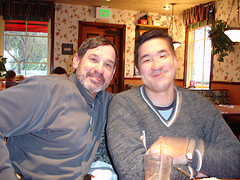
We celebrated New York New Year. This means we embraced the year 2007 at 9 p.m, New York time. While we are waiting for the dawn of new year, we played pictionary, had a time of reflection on 2006 and shared dreams for 2007. We prayed as we step into the year 2007. I am excited to see what God is going to do with our church, my family, and myself. I am so excited, I can't contain my joy. 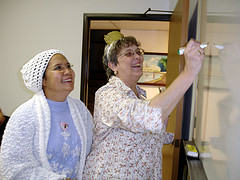
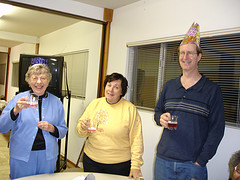

Posted by
Come and See Africa
at
5:51 PM
0
comments
![]() Links to this post
Links to this post
Adventure? or Trouble?
Chris is in Africa. He left on Dec. 28 with Lelia to London. They will meet with Frank in London, then Lelia will travel alone to Africa then meet Chris and Frank in Kigali.
Zach left on Dec. 28th to go back to D.C via Dallas . He called me from Dallas and told me that he is having trouble with the car. I tried to persuade him not to drive the old car during this time of the year. Zach insisted, and Chris encouraged. It is so hard to understand him and Chris. They think this is an adventure. To me it is a trouble. I wouldn't mind having an adventure, but I want to avoid troubles. How do you distingush an adventure from a trouble? It is time to let him go. Zach is an adult, and he can take care of himself. I did my best to help him not getting into trouble. Fixing the car, which cost me $1000, and helping him with gas. It is now out of my hand, I need to let him be an adult. I am trying very hard to distance from his adventure. Now it is his adventure that he needs to experience the consequences.
Posted by
Come and See Africa
at
5:30 PM
0
comments
![]() Links to this post
Links to this post
